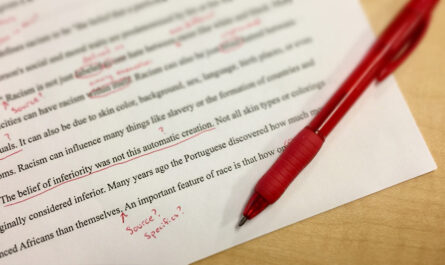There’s a worsening inherent in too many gerunds creeping into your work. So staying aware of the gerunds appearing in your writing is well worth doing.
Wow—what an awful dek! It pained me to write it. But I hope it gets the point across: gerunds don’t belong just anywhere, and a gerund in the wrong place can sound a sour note.
Quick refresher: a gerund is the part of speech created when a verb (specifically the present participle, the form of the verb ending that ends in “-ing”) is repurposed as a noun. A verb describes an action (dynamic! energetic! alive!), but when it’s used as a gerund, it becomes a thing (static, lifeless, dull).
I love to swim! 😃
I love swimming. 😐
Of course, there are plenty of times when using a gerund is appropriate, even necessary. So it would be foolish to try to eliminate all gerunds from your writing. (How, for instance, am I supposed to talk about writing if I can’t use the gerund “writing”?) But as with all habits, moderation is key. If you need to describe an activity, by all means reach for a gerund. My goal with this essay is only to point out some of the ways gerunds are overused or, worse, used incorrectly.
I once had an editor who routinely struck out gerunds, and at the time, I found it a bit excessive—it’s a perfectly legitimate part of speech, after all. But after atomizing sentences for years, taking them apart and putting them back together again, I’ve started to come around. All too often, a gerund is used where a verb would impart a greater sense of action or urgency, or where a different construction would result in less ambiguity. Every sentence is unique (at least, that’s usually the idea), so there’s no hard and fast rule, nor even much of a guiding principle. Still, I hope that, through the examination of a few examples, the differences between gerunds and their non-gerund alternatives will become clear.
Dieting alone is not an effective means of losing weight.
Dieting alone is not an effective way to lose weight.
Both of these sentences are perfectly grammatical. Both “a way to lose weight” and “a means of losing weight” are object noun phrases. So the gerund in the first sentence isn’t exactly wrong. But doesn’t it fall a bit flat? Don’t your eyes start to glaze over before you’ve even reached the period? It’s subtle, but it comes across in the sentence’s overall loss of momentum.
On the other hand, did you notice the gerund up top—“Dieting”? It would be hard to improve on it.
The championship doesn’t always go to the team scoring the most points.
The championship doesn’t always go to the team that scores the most points.
Having attended med school, they’re considered a reliable source for health information.
Because they attended med school, they’re considered a reliable source for health information.
Again, these examples of gerundive phrases aren’t incorrect—they’re just flaccid. (In fact, they’re not even gerundive; they’re participial phrases. I’m going to conflate gerunds and present participles a few more times before this essay is over—if the distinction interests you, Email me for my tutoring rates.) In constructions like these, you can almost always swap in a more active verb to give your sentence a bit more shine.
And often, a noun phrase doesn’t need to include an action at all:
Increasingly, architecture is moving toward using more sustainable building materials.
Increasingly, architecture is moving toward more sustainable building materials.
I hope you’ll agree that the meaning of these sentences is the same. But the second gets to the point a bit faster. It goes without saying that the materials are being used for something, so tossing in the gerund “using” makes the object noun phrase—the series of words that describes the thing being moved toward—a word longer without significantly changing its meaning.
(There are a few other words that end in “-ing” in this example—but don’t confuse these for gerunds. The first [“moving”] is a present participle; with “is,” it forms a verb in the present continuous tense. The other [“building”] is an adjectival noun that modifies “materials”; does it refer to the act of building or the structure itself? The distinction is academic—in either case, it’s no longer acting as a noun. More importantly, and despite the fact that they represent three different parts of speech, the repetition of “moving,” “using,” and “building” in quick succession sounds a bit odd.)
A few more examples of this phenomenon:
She describes her latest work as being a poem disguised as a novel.
She describes her latest work as a poem disguised as a novel.
He is famous for giving his fresh perspective on the hospitality scene.
He is famous for his fresh perspective on the hospitality scene.
I wanted to focus on highlighting artworks that will bring a tear to the viewer’s eye.
I wanted to highlight artworks that will bring a tear to the viewer’s eye.
These gerunds turn the object noun into an action, but they do nothing to improve our understanding—they only add another layer of grammatical complexity to what should be a relatively straightforward sentence.
Her book represents a fresh new voice, liberating the mystery genre’s tropes from tired cliché.
Her book represents a fresh new voice that liberates the mystery genre’s tropes from tired cliché.
Her book represents a fresh new voice and liberates the mystery genre’s tropes from tired cliché.
This is one of the most common ways gerunds go wrong: a noun phrase tacked onto the end of a perfectly good sentence. It doesn’t feel especially awful—it almost makes sense—but note the ambiguity it causes. The second and third sentences have different meanings (in one, her book does the liberating, and in the other, her voice does), yet both are plausible interpretations. So which sense is the first sentence actually trying to convey?
What’s happening here is that, because the event is described as an action that has no clear actor (rather than by a verb with a subject), whatever is responsible for that action is being obscured. Sometimes this is even intentional—an attempt to deny, obfuscate, or downplay agency in much the same way passive voice does:
The prime minister’s office became the focus of a scandal, derailing the peace talks.
The prime minister’s office became the focus of a scandal that derailed the peace talks.
The prime minister’s office became the focus of a scandal, which derailed the peace talks.
The difference here? The second sentence ends in a restrictive modifier (i.e. this particular scandal derailed the peace talks), while the third ends in a non-restrictive one (i.e. the mere fact that the prime minister’s office became the focus of a scandal derailed the peace talks, and an altogether different scandal may have produced the same result). In the first sentence—the one with the gerund—it’s clear that the scandal derailed the peace talks, but exactly how that played out is unclear. Perhaps it was the media’s decision to focus on it that’s to blame. Depending on the nature of the scandal, that could affect how readers assign responsibility.
While the example just above is (arguably) grammatically correct, it often mutates into a form that exceeds the limits of acceptable syntax:
Even before walking through the doors to the new restaurant, the smell of simmering spices is intoxicating.
Even before you walk through the doors to the new restaurant, the smell of simmering spices is intoxicating.
In the first sentence, the “walking” seems to be happening even though there’s no mention of the person doing it. That’s your first clue that you’re looking at a dangling modifier.
More ambiguity:
By fostering personal accountability and connecting with family, the new program builds on traditional talk therapy.
By fostering personal accountability and connection with family, the new program builds on traditional talk therapy.
She spent the afternoon writing about growth and transforming.
She spent the afternoon writing about growth and transformation.
As a general rule, don’t use a gerund when a perfectly good noun will do the job just as well, if not better. Because the examples just above include present participles in a parallel construction, it’s possible to confuse their gerunds for verbs—and to come away thinking that the new program connects with family, or that she spent the afternoon transforming.
But wait! It gets worse:
They arrived at the venue at 6 o’clock, with the festivities starting shortly thereafter.
They arrived at the venue at 6 o’clock, and the festivities started shortly thereafter.
Thomas’s work will be displayed in the Smithsonian, with the exhibition increasing his exposure tenfold.
Thomas’s work will be displayed in the Smithsonian, increasing his exposure tenfold.
The show is saturated with nostalgia, with the opening theme song nodding to its late-’60s setting.
The show is saturated with nostalgia—even the opening theme song nods to its late-’60s setting.
I call this the “with–noun–gerunding” construction; perhaps it has another name, but I doubt it, because it shouldn’t exist in the first place.
When it’s not part of a phrasal verb, “with” typically suggests two or more things considered together (“I came with Susan”) or combined together (“I ate a salad with French dressing”), or something in the possession of something else (“He showed up with a bottle of wine”). So while it’s clear that “the festivities starting,” “the exhibition increasing,” and “the theme song nodding” are noun phrases—things that happened / will happen / are happening—whether they’re meant to belong to something or be considered or combined with something is indeterminable. They’re just there, adding new ideas to the sentence without a clear sense of connection.
Some of the “corrections” I’ve made to the sentences throughout this essay are subjective; there may be different, even better ways of solving to solve the problems gerunds wreak—my insertion of “even” in the last example sentence just above slightly alters its emphasis, for instance. These are judgment calls, and people are welcome to argue them, but let’s never lose sight of the real goal here: to craft sentences that get the job done as effectively and elegantly as possible.
They acted as though ridding themselves of old clothing was a way to rid themselves of their bad memories.
They acted as though ridding themselves of old clothing was a way of ridding themselves of their bad memories.
They acted as though to rid themselves of old clothing was a way to rid themselves of their bad memories.
They acted as though to rid themselves of old clothing was a way of ridding themselves of their bad memories.
Sometimes, there’s just no finding a clear answer.



